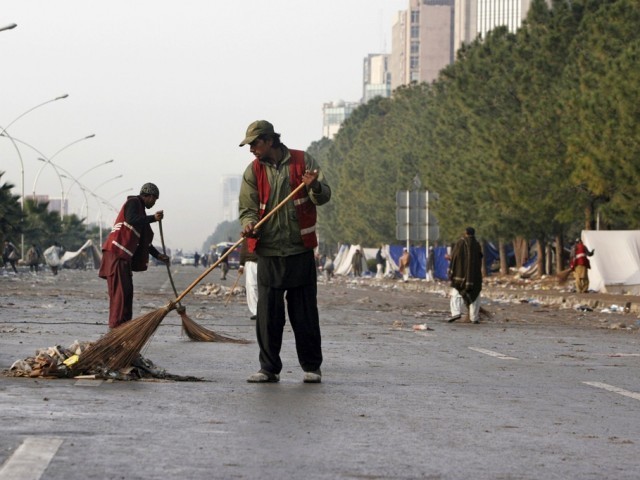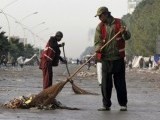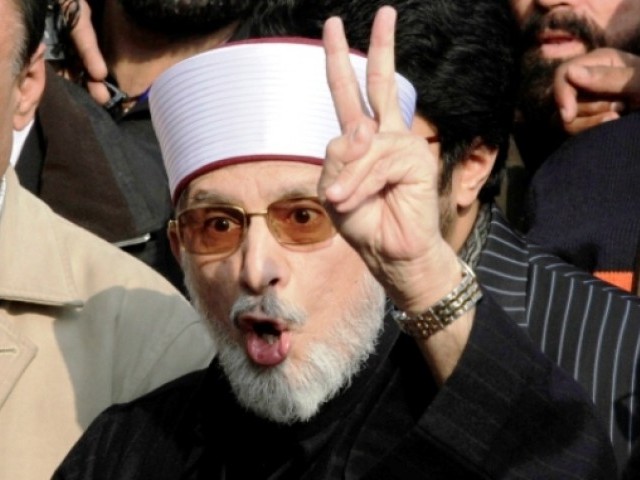He came,he saw,and he did not conquer
 Cleric Tahir-ul-Qadri made a sudden landing in Pakistan from Canada, addressed a large gathering and threatened the Government in Islamabad with dire consequences if it did not quit. Then he returned.
Cleric Tahir-ul-Qadri made a sudden landing in Pakistan from Canada, addressed a large gathering and threatened the Government in Islamabad with dire consequences if it did not quit. Then he returned.
Though the ‘Pakistan Spring’, launched with fanfare at Lahore on December 23, 2012, fizzled out when the January 15 Islamabad rally failed to gather momentum, its enduring lesson is that nations targeted for ‘revolution’ by foreign-returned messiahs must subject the putative saviours to close scrutiny.
Someone in Pakistan would have been alerted that Canadian-Pakistani dual citizen, Tahir-ul-Qadri, founder of the political party, Pakistan Awami Tehreek, and voluntary organisation, Minhaj-ul-Quran, had roused the fury of scholars at the prestigious Al Azhar seminary for assuming the title ‘Shaykh-ul-Islam’. The angry scholars pointed out that Pakistan is not an Islamic state on the lines of Turkey under the Khulafa Uthmani where Shaykh-ul-Islam was also an appointed position endorsed by the Khalifa. Hence, no authority in Pakistan or Egypt can sanction this title.
Shaykh-ul-Islam, as per authorities such as Allamah Shams El-Din El-Sakhawi, “is a title attributed to that follower of the Book of Allah Most High and the example of His Messenger, who possesses the knowledge of the principles of the Science (of Religion), has plunged deep into the different views of the scholars, has become able to extract the legal evidences from the texts, and has understood the rational and the transmitted proofs at a satisfactory level.”
Mr Qadri roused scepticism when he addressed the Islamabad rally in English; he also spoke in Urdu. Earlier, in August 2010, he ran a week-long anti-terrorism camp for Muslim youth at the University of Warwick to tackle extremism in the UK. Friends who saw him there noted he spoke in English in an era when jihadis are spewing Arabic! It was obvious he could not attract the youth moving toward the jihadis; he must have been in the UK for some other purpose.
The Al Azhar scholars questioned Mr Qadri’s academic credentials and the need for Arabic translators during a trip to Egypt, when every Alim in Islamic history who held the title Shaykh-ul-Islam, was proficient in Arabic. Demanding that he furnish evidence that a legitimate authority had conferred the title on him, and the grounds for the same, they warned (prior to his return to Pakistan) that he planned “to instigate a ‘revolution’ like the ones that have brought civil wars and instability to North Africa (i.e. Libya) and the Middle East (i.e. Syria), causing catastrophic grief and releasing a flood of extremists”.
Certainly, Mr Qadri has a background worth noting, and has travelled widely in the past decade, discussing issues of concern to Muslims and the West. In March 2010, he drew international acclaim with his unconditional fatwa on terrorism and was feted by the international media, drawing appreciation from the US State Department.
Mr Qadri’s significant connections include Turkish Sufi scholar Fettullah Gulen, who was ‘used’ by the West, according to informed sources. The FBI’s former Turkish-American translator Sibel Edmonds (sacked in 2002) testified in 2010 in the court case of Fetullah Gulen, who was seeking a green card, confirming US-Saudi sponsorship of radical mosques and Islamists in Central Asia. She described American Government documents which she had transcribed during her service. This means Washington was looking for a proxy for effective control of the region and asked Turkey, a Nato ally, for help as Turkey shares the same racial heritage as the population of Central Asia, the Turkic language, and religion (Sunni Islam).
Experts believe that Turkish organisations like the $25 billion Gulen movement, reportedly financed by the CIA, Saudi Arabia and Turkey, have been establishing madarssas and mosques across Central Asia, including Uzbekistan, Azerbaijan, Kazakhstan and Turkmenistan, for over a decade. Gulen, now based in Pennsylvania, is close to Graham E Fuller, former CIA station chief in Kabul, important analyst for the Council on Foreign Relations, and author of The Future of Political Islam.
At the January 15 rally, Mr Qadri accused the Pakistani Government of being corrupt and incompetent; he demanded that elections be deferred until the Election Commission was reconstituted; an impartial and honest caretaker Government installed in consultation with the Army and Judiciary; and Articles 62 and 63 of the Constitution dealing with candidate eligibility implemented. He seemed to have received a boost when the Chief Justice called for the immediate arrest of Prime Minister Raja Ashraf Pervez in a corruption case; but suspicions that the Army and Judiciary were using him to instigate a ‘soft coup’ dented public support for him.
The Army and Mr Qadri both denied the rumours, but he was tainted by his energetic support to former Army chief and President Pervez Musharraf after the coup of 1999. He served in the national Assembly under Mr Musharraf before moving to Canada in 2006, after some differences with Mr Musharraf.
The corruption case regarding private power stations relates to Mr Pervez’s tenure as Power Minister, but he has not been personally convicted in any case and hence the order for his arrest was not executed. The overall crisis was defused by dexterous political management by the ruling party; Mr Imran Khan’s demand for the immediate resignation of President Asif Ali Zardari fell flat. However, the mysterious murder of Kamran Faisal who was investigating the case has not helped the Government’'s credibility.
The beleaguered regime, however, defused Mr Qadri ‘revolution’ by sending a high-level delegation for talks, thus giving him a face-saver. Nawaz Sharif, Altaf Hussain and others also sent messengers to talk to him. As the Government made it clear that it would complete its tenure and have elections on schedule, all that Mr Qadri got was a vague promise of dissolution of the Provincial Assemblies and consultations regarding a caretaker Prime Minister.
Meanwhile, someone doubtless nudged the Canadian authorities, because as soon as the ‘Pakistan Spring’ crowd moved off the streets, they issued summons to Mr Qadri to report for questioning on February 5 regarding violation of the oath he took while seeking asylum. Mr Qadri had sought asylum in 2008 on the plea that he could not enter his native country, Pakistan, and feared threats to his life after meeting the Danish cartoonist who made blasphemous caricatures of Prophet Muhammad. His asylum application was accepted in October 2009, and he received his Canadian passport six months ago.
Thereafter, his rather prompt and high-profile political activity in Pakistan was at variance with claims made while seeking asylum and citizenship in Canada. Chastened by this turn of events, Mr Qadri returned to Canada after announcing that neither he nor any member of his family would contest elections. He may never return.
This refers to the article, “He came, he saw, and he did not conquer” (January 29) by Sandhya Jain.
The writer's analyses of our neighbours are often based on an incomplete read of what really goes on in the region. She portrays Tahir-ul-Qadri as a Canadian agent who speaks in English and has incurred the wrath of Islamist scholars in Al Azhar. Ms Jain's knowledge of Al Azhar and Pakistan is inadequate, to say the least.
Mr Qadri has the backing of the Pakistani Army. He is acting at the Army's behest, an Army that was fed up with what it had perceived as the mismanagement of the Asif Ali Zardari Government. The Army is unable to more directly intervene as that would earn the ire of the United States, which is against any direct military involvement in Pakistan's governance. But then, Ms Jain is so anti-US that she would refuse to acknowledge that the failure of Tahir-ul-Qadri had more to do with the behind the scenes action of the US.
For Tahirul Qadri, it’s a win
What he has accomplished is quite a feat for someone without a single parliamentary seat to his name. PHOTO: REUTERS
The revolution is over. Democracy is saved. Islamabad the green will become even greener, thanks to all the fertiliser. The ‘padri’ is now very much a player. The ‘former’ government is now a coalition partner, the ‘yazeedis’ are now buddies and Karbala, it seems, came with a conference-ready container.
Bad jokes and highly inappropriate references aside (hey, they started it), we can breathe a collective sigh of relief that it all ended without violence because, for a while there, it all looked very touch and go.
I’m also glad that the army kept its boots off, and didn’t tip the balance when the Chief Justices’s arrest orders for Prime Minister Ashraf miraculously
coincided with TuQ’s speech. A
meray aziz humwatno moment seemed imminent at that point. That it didn’t come is no small blessing.
Apart from a certain biscuit brand that can now benefit from instant brand recall (Tuc), a clear winner is the tissue paper industry. Up until yesterday, a certain Amazingly Asinine columnist and a Kriminally Krackpot anchor were using several dozen boxes a day to wipe the drool from their chins. Now they’ll be mopping tears of disappointment that
Zardari’s head was not served to them on a platter.
But they’re not the only ones who have to swallow a bitter pill.
Nawaz Sharif seems locked out of this set-up and he certainly won’t be pleased. The question of whether the President has pulled the wool over his eyes for the 15,864th time will very much be bothering him. Nor will he (or any PPP opponent) be glad to see that
Qamar Zaman Kaira has emerged from the anemic ranks of PPP leaders as a man who can walk the walk and talk the talk, flip flopping with the ease and skill of a Cirque du Soleil performer. And all with a smile on his face.
Imran Khan, who has seen his slogan of change effectively appropriated by Qadri, did, in the end, the only thing he could have done, agree with Qadri’s intentions, but not his methods.
It’s an open question if he can once again tap into the simmering reservoir of discontent that both he and Qadri are trying to siphon and translate that into electoral gains.
The Supreme Court remains the ultimate wildcard. Pursuing what seems like an anti-government vendetta it has, in the past few days, not only issued arrest orders against the PM but also admitted the hearing of a (wait for it)
blasphemy petition against Sherry Rehman that even the LHC’s Multan bench refused to entertain. What will the CJ make of this agreement, I wonder?
While the
MQM has come under some muted criticism (all criticism of the MQM is muted) for kind-of-sort-of throwing in their lot with Qadri, this will make absolutely zero difference to its power base. Such is the indispensability of the MQM, that anyone wanting to form a stable government in Sindh will need them no matter what.
As for Qadri himself, it’s a win.
For now.
Having failed to make any serious inroads into Pakistani politics for decades he’s now going to be consulted (or is it consensus?) on not only the makeup of the election commission but also the choosing of the caretaker PM. Not only that, the discussions will take place in MQI offices! That’s quite a feat for someone without a single parliamentary seat to his name! Imran may be wishing he had marched to Islamabad instead of the border of Waziristan. This is of course if the agreement holds.
More ominous is the precedent that has been set. It seems that, in order to paralyse the federal capital and make the government bow to your demands all you have to do is
march on Islamabad.
Be assured that others are taking note.
As for me, I’m raising money for a plane ticket (for me) and buses (for the rest of you) for a march to get
YouTube unblocked.
Are you with me or with the Yazeedis?
(Manufactured) revolution mubarak
January 15, 2013
We were so close to having a democratic transition of power; now we will watch this game of shadows being played out.
Congratulations, Pakistan!
The ‘manufactured’ revolution just came to a country near you.
After the stunning success of People’s Power movements, Colour Revolutions and various Springs, we bring you the
Pakistani Winter.
You can thank the best strategic minds in Pakistan and beyond for bringing you this stunning and beautifully coordinated production. We’ve been called paranoid, we’ve been called incurable conspiracy theorists and cynical naysayers but guess what? We were right all along.
It’s not paranoia if they really are out to get you.
But you know what? I actually find it quite sweet.
It’s unfolded with the coordination of a Bolshoi ballet, the choreography of Disney on ice, the farce of Monty Python. And let’s admit it: it was kind of beautiful in its sheer cynicism. No one can accuse the Dirty Tricks Brigade of not being able to learn new tricks. The electronic media brought the last dictator down?
No problem, lets just buy them with ads. Social media upsetting the status quo around the world? No problem, lets manufacture #Revolution hashtags and saturate.
Once again, black is white and up is down. The lack of water at Karbala is equated with a
lack of diesel in Islamabad. Our former dictator Musharraf now calls his rule a democratic one. An
imported cleric, like it or not, just managed to articulate the frustration of the masses where a domestic government could not.
Yes, we need to blame the establishment and the judiciary for once again supporting, enabling and coordinating an undemocratic change in this country. We must call them to account for cratering the runway when we were so close to the finish line.
But they aren’t the only ones to blame. Had the government delivered even the semblance of governance in the past four odd years, there would not have been even five thousand people on the streets right now.
Had the government any moral authority, or any authority at all, this man would not have been able to hold the country hostage. That they did not, that they squandered such a mandate, that they allowed the establishment – which has been at its lowest ebb in decades – to pull off something on this scale, is a true tragedy.
We were so close; so close to actually having a democratic transition of power; so close to cementing the democratic process in Pakistan. And now we are once again reduced to watching this surreal game of shadows being played out.
So what now?
Will we see some political parties (MQM, PTI and PML-Q, I’m thinking of you) and leaders now endorse this manufactured revolution and destroy their future for the sake of a temporary accommodation?
Will this turn out to be yet another martyrdom for the defeated and decrepit PPP to cash in on?
I don’t know. But one thing that’s sure is the forces that came up with this scenario have war-gamed and brainstormed it to near-perfection.
We’re just along for the ride. And yes, it will be a bumpy one.







